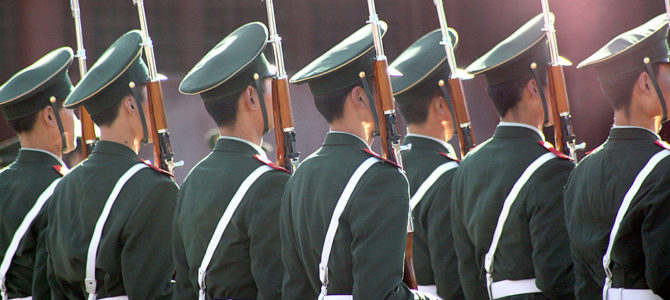
Much has been made of Americans’ desire to return to halcyon days. Instead, the specter of the 1930s now haunts the world landscape.
Western countries’ response to the extraordinary economic dislocation of the Great Depression was to turn inward. Internal divisions weakened the possibility of collective security action, with the French fighting to retain the gold standard while the British sought to strengthen the sterling zone among their empire. The United States floated its currency to help farmers and other debtors suffering from the Depression.
Worse, the West, still traumatized by the First World War and focused on disarmament, feared taking on the obvious growing evil of the Nazis in their midst. As Germany rearmed, France, Britain, and the United States were too concerned about the pressing economic problems of the Depression to take vigorous action.
In the early 1930s, the United States was eager to wash its hands of world problems and take a domestically focused approach to its economic woes – leaving the gold standard, raising tariffs, and launching enormous statist infrastructure programs. Sound familiar? This atomized world proved incapable of pushing back collectively against revanchist Germany, Italy, and Japan, allowing them to metastasize into the threats they became.
Rectifying Historical Grievances
Germany then, like today’s China and, to a lesser extent, Russia, focused on rectifying historical grievances and losses of territory. In the 1930s Germany sought its Lebensraum in the east, the recovery of territory lost to Poland in the First World War, and elimination of the stain of Versailles. Italy sought the glory and empire it felt Versailles denied it as a victor of the war.
Today China has swallowed Hong Kong whole and is making ever more threatening noises about Taiwan. President Xi Jinping’s animating philosophy is to reverse the centuries of humiliation, both real and imagined, China suffered at Western powers’ hands. Russia, too, seeks redress of historical grievances and the piecemeal reassembly of the Soviet empire, whether in Central Asia, Ukraine, or the Baltics.
Enemies Remilitarize while West Distracted
Empowered by the West’s internal squabbling during the 1930s, Adolf Hitler continued to press his advantages – remilitarizing the Ruhr region, the Austrian Anschluss, and the partition of Czechoslovakia. In each case, the trauma of the First World War, the economic stresses of the times, and the lack of an allied vision led the West to seek alternatives to confrontation. It was not until the invasion of Poland that Britain and France finally were stirred to act.
Indeed, the Nazis used the West’s predilection for diplomacy and endless discussions of disarmament to stall for time while its remilitarization continued under the radar until its return as a world military power was a fait accompli. China has done much the same, quietly building its military force over the last two decades until today, when it feels much more prepared to dictate terms.
As in the 1930s, today the every-man-for-himself ethos is strong, from America’s abandonment of the Trans-Pacific Partnership and its nearly unilateral bugout from Afghanistan to Germany’s embrace of the Nord Stream 2 pipeline, to France’s louder calls for independent European security arrangements. America’s shambolic exit from Afghanistan without any collaboration with North Atlantic Treaty Organization allies supporting the mission has fractured the alliance badly and called into question America’s appetite for defending the world order, just as in the 1930s. Enemies and friends alike are now questioning whether the United States would come to the rescue of Taiwan, NATO, or others.
China’s Aggression
To be sure, there are differences. Unlike the 1930s, economic ties among antagonists, particularly the United States and China, are robust and conflict risks throwing both countries into economic turmoil. Whether that is enough to contain China’s aggressive revanchism is unknown.
Today’s Western retrenchment is as provocative as it was in the 1930s. Then, the Germans dictated the tempo of events until war became inevitable and Germany strong enough to prosecute it for six years. Today, with the United States signaling its retreat and without some form of credible collective Western security arrangements, China will gladly fill the vacuum with no resistance.
The questions now, as in the 1930s, will be these: what would be a bridge too far for the West? How far can China press its advantage until the West pushes back? And what will that pushback look like?









